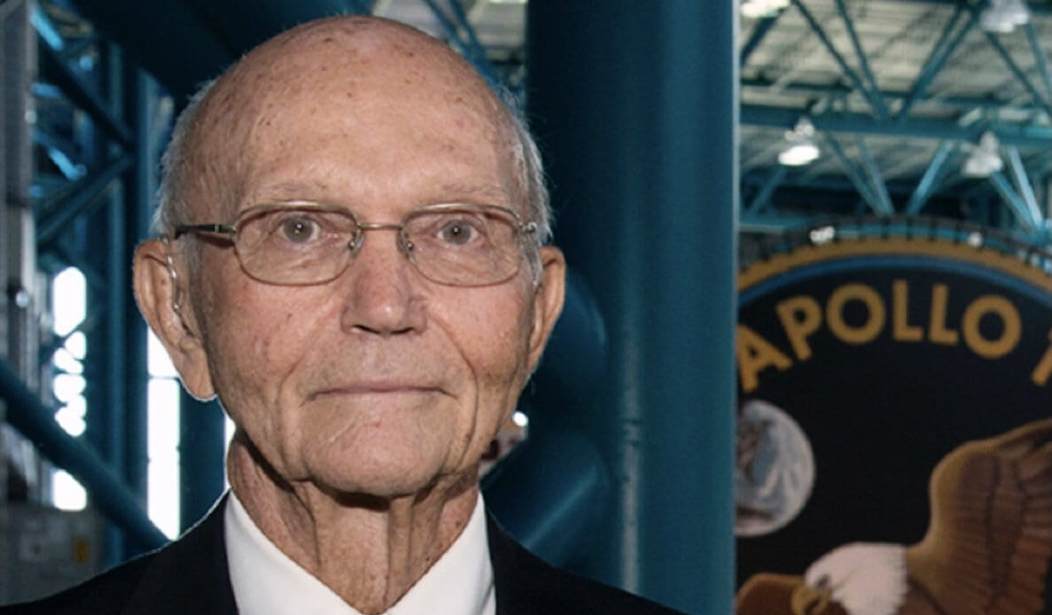When you think of the Apollo 11 mission, you think of Neil Armstrong and Buzz Aldrin. Many forget that while the first two men on the moon were conducting their first walks on our largest satellite, there was another man, far from home, completely alone, without whom the mission would have never been a success.
Michael Collins, Apollo astronaut and “third man” of the Apollo moon mission has died at the age of 90 after a battle with cancer.
His family released a statement on Twitter following his passing:
Family Statement on Passing of Astronaut Michael Collins pic.twitter.com/6OAw7CzFaz
— Michael Collins (@AstroMCollins) April 28, 2021
The statement read:
We regret to share that our beloved father and grandfather passed away today, after a valiant battler with cancer. He spent his final days peacefully, with his family by his side. Mike always faced the challenges of life with grace and humility, and faced this, his final challenge, in the same way. We will miss him terribly. Yet we also know how lucky Mike felt to have lived the life he did. We will honor his wish for us to celebrate, not mourn, that life. Please join us in fondly and joyfully remembering his sharp wit, his quiet sense of purpose, and his wise perspective, gained both from looking back as Earth from the vantage of space and gazing across calm waters from the deck of his fishing boat.
Our family asks for privacy during this difficult time. Details on services forthcoming.
Collins’ Apollo 11 crewmate (the last surviving at this point) Buzz Aldrin, memorialized Collins in a Tweet:
Dear Mike,
Wherever you have been or will be, you will always have the Fire to Carry us deftly to new heights and to the future. We will miss you. May you Rest In Peace. #Apollo11 pic.twitter.com/q4sJjFdvf8— Dr. Buzz Aldrin (@TheRealBuzz) April 28, 2021
Collins was born in Rome, Italy on October 31, 1930, the son of a military attache stationed there. After returning to the US, Collins was appointed to West Point, graduating from there in 1952. Collins then joined the United States Air Force, first in the capacity of a fighter pilot and maintenance officer and later as a test pilot. After witnessing John Glenn’s first space flight, Collins decided to apply for the next astronaut program. Initially rejected during the second round of astronaut selections, Collins was one of fourteen selected for the third round of training.
Collins was a part of the Gemini program, successor to the Mercury program, which inspired his own application to the Astronaut Program. On July 18th, 1966, Gemini 10 carried Collins and fellow astronaut John Young into orbit, where Collins and Young performed two EVAs (extravehicular activity) and docked with both their own Agena (engine) and the Agena from Gemini 8, which had flown 4 months earlier.
Though initially scheduled to next join Apollo 8, a mission to orbit the moon, Collins was forced to back out due to an issue with his spine. He was replaced on that mission by Jim Lovell (of Apollo 13 fame) and rescheduled for Apollo 11 with Neil Armstrong and Buzz Aldrin.
On July 16th, 1969, Apollo 11 left Kennedy Space Center bound for the first manned landing on the moon. After achieving lunar orbit, Armstrong and Aldrin descended to the surface of the moon in the Lunar Module, Eagle, while Collins maintained orbit above in the Command Module, Columbia. Nearly a day later, Eagle departed the surface of the moon, rendezvoused with Columbia and the crew returned safely to Earth.
While Armstrong’s and Aldrin’s names became synonymous with the first lunar landing, Collins was the lesser-known “third man” of the Apollo missions. Though Collins left NASA shortly thereafter, he remained in the Air Force Reserves. By 1976, he had achieved the rank of major general.
After Collins left NASA he became the Assistant Secretary of State for Public Affairs during the Vietnam era. Collins found himself hating the job and sought President Nixon’s blessing of the position of Director of the National Air and Space Museum, a role he was granted and held until 1978 when he became the undersecretary of the Smithsonian Institute.
Collins served as VP of LTV Aerospace and in 1985, started his own consulting firm. He wrote and was featured in numerous books and movies, chronicling the Space Program. He was a painter and an avid fisherman. He was preceded in death by his wife of 57 years, Patty, who died in 2014.
Michael Collins was a great American and we honor his legacy and service.













Join the conversation as a VIP Member